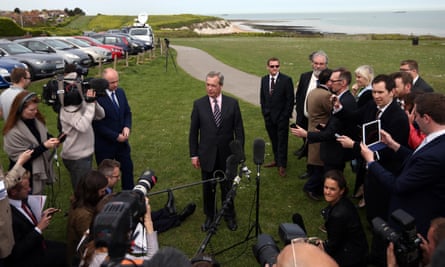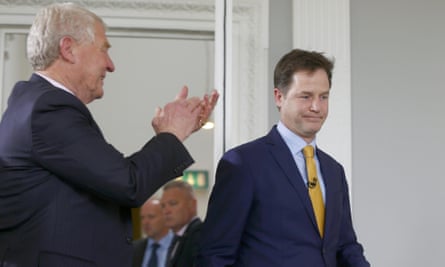David Cameron began to form his first government comprised solely of Conservative cabinet members on Friday after being delivered an overall Commons majority by a tumultuous election.
The result claimed the scalps of an unprecedented three party leaders in one day as Labour’s Ed Miliband, the Liberal Democrats’ Nick Clegg and Nigel Farage of Ukip announced their resignations.
Cameron and his wife, Samantha, travelled to Buckingham Palace where he accepted the invitation of the Queen to form a government. He later reappointed George Osborne as chancellor, Theresa May as home secretary, Philip Hammond as foreign secretary and Michael Fallon as defence secertary.
In an election suffused with historical and political significance, the Tories won 330 seats, four more than the 326 required for an overall majority, while Labour collapsed to 232, worse than its dismal 2010 performance. The result confounded a string of opinion polls that suggested Labour and the Conservatives were neck and neck, and that Britain was heading for a constitutional stalemate.
Cameron’s position means, paradoxically, that he is more reliant on the support of his backbenchers than in the last government, when the combined strength of the Tory-Lib Dem coalition meant he enjoyed a stronger majority in the Commons.
In Scotland, Labour found its citadel sacked, securing only one seat – Edinburgh South – in what had once been its heartland. The SNP took 56 of the 59 seats north of the border.
The Liberal Democrats were devastated across Britain, collapsing from 57 seats to eight. Its most senior ministerial figures, including Ed Davey, Danny Alexander, Simon Hughes, Vince Cable and David Laws were ejected by an electorate that had lost trust in Clegg’s party.
Speaking on the steps of Downing Street, Cameron promised to restore the Conservative party’s one-nation credentials and recommitted himself to holding an in-out European Union referendum by 2017. He has also promised to try to reach out to backbenchers, ending the sense of cliquishness around the leadership.
The prime minister said: “ I want my party, and I hope a government I would like to lead, to reclaim a mantle that we should never have lost – the mantle of one nation, one United Kingdom.”
He paid tribute to Miliband and Clegg, and adopted a more emollient tone than in the wake of the Scottish referendum last September, saying he wanted to bring together the nations of the United Kingdom.
“I have always believed in governing with respect.” This was why, he said, he had offered devolution to Scotland, Wales and Northern Ireland. In Scotland his plan was “to create the strongest devolved government anywhere in the world with important powers over taxation”. Rather than dwelling on the rights of the English, he said: “No constitutional settlement will be complete if it did not also offer fairness to England.”
Cameron promised to rebalance the economic recovery and give the poorest people the chance of training for a job and hope for the future.
His triumph was largely built on a barrage of warnings that a minority Labour government propped up by the Scottish National party would threaten the economic recovery, and leave Miliband as prey to the demands of the SNP leader, Nicola Sturgeon.
In a day of often dignified and thoughtful concession speeches, Farage, thwarted in his attempt to become MP for Thanet South, said he was personally relieved by his defeat. He claimed his party, which finished second in a swath of constituencies in the north of England held by Labour, had become the party of young, working women.

Although Farage offered his resignation, asking Suzanne Evans to become temporary leader, he said he would take a holiday and see if his party wanted him to return to the leadership in the autumn.
“There hasn’t been a single day since 1994 that hasn’t been dominated by Ukip,” he said. “I have tried to mix that with family, I tried for nine years to mix it with running my own business.
“It really has been seven days a week, totally unrelenting, and occasionally let down by people who perhaps haven’t always said and done the right things. So I feel a huge weight has been lifted off my shoulders.”
Within 30 minutes of Farage’s resignation, Clegg, red-eyed and crushed, ended his eight-year period as party leader, describing the election results as “one of the most crushing blows to the Liberal Democrats since our party was founded”.
He defended his decision to join the coalition in 2010, saying it had been right to save the country at a time of national economic crisis.
“It’s easy to imagine that there is no road back, but there is because there is no path to a fairer, greener, freer Britain without British liberalism showing the way,” he said.

Clegg conceded that the result marked a historic low. “This is a very dark hour for our party but we cannot and will not allow decent liberal values to be extinguished overnight. Fear and grievance have won, liberalism has lost, but it is more precious than ever and we must keep fighting for it,” he said.
The two obvious frontrunners to succeed him are Norman Lamb, who is close to Clegg politically, and Tim Farron, the darling of the party conference but less experienced in office. An angry leftwing contingent in the party are bound to demand a shift away from the centre, saying they had warned Clegg repeatedly he was marching the party towards annihilation.
The third of the vanquished leaders, Miliband, received a rapturous reception from Labour party workers before announcing he was resigning on Friday afternoon and asking Harriet Harman to take over as caretaker leader while the party elected a replacement.
He said: “ I take absolute and total responsibility for the result and our defeat at this election.”
Of those Labour candidates who lost their seats or failed to win, he said: “They’re friends, colleagues and standard bearers for our party, they always have been and they always will be.”
He added: “We have come back before and this party will come back again.”
The Labour leadership election will be held under a near one-person-one-vote system that abolishes the old electoral college that gave the unions a third of the vote. Potential candidates include Yvette Cooper, Chuka Umunna, Andy Burnham, Dan Jarvis and Liz Kendall.
Jim Murphy, the Scottish Labour party leader who lost his seat, vowed to stay on to fight the SNP in 2016 Scottish parliamentary elections, saying that five months as leader was not enough time to turn around the party’s fortunes. “We have been overwhelmed by history and by circumstance. We make no excuses – a party can never blame the electorate – but we found ourselves hit by the perfect storm.”
He added: “We were hit by two nationalisms. A Scottish nationalism reassuring people that they could vote SNP and get Labour. And an English nationalism stoked up by David Cameron: warning vote Labour and get SNP.
“Unsurprisingly, forced into an artificial contest between English nationalism and Scottish nationalism, many Scots, including many no-voting Scots, chose the SNP. And let’s be clear: it wasn’t just in Scotland that the SNP cost Labour votes.”